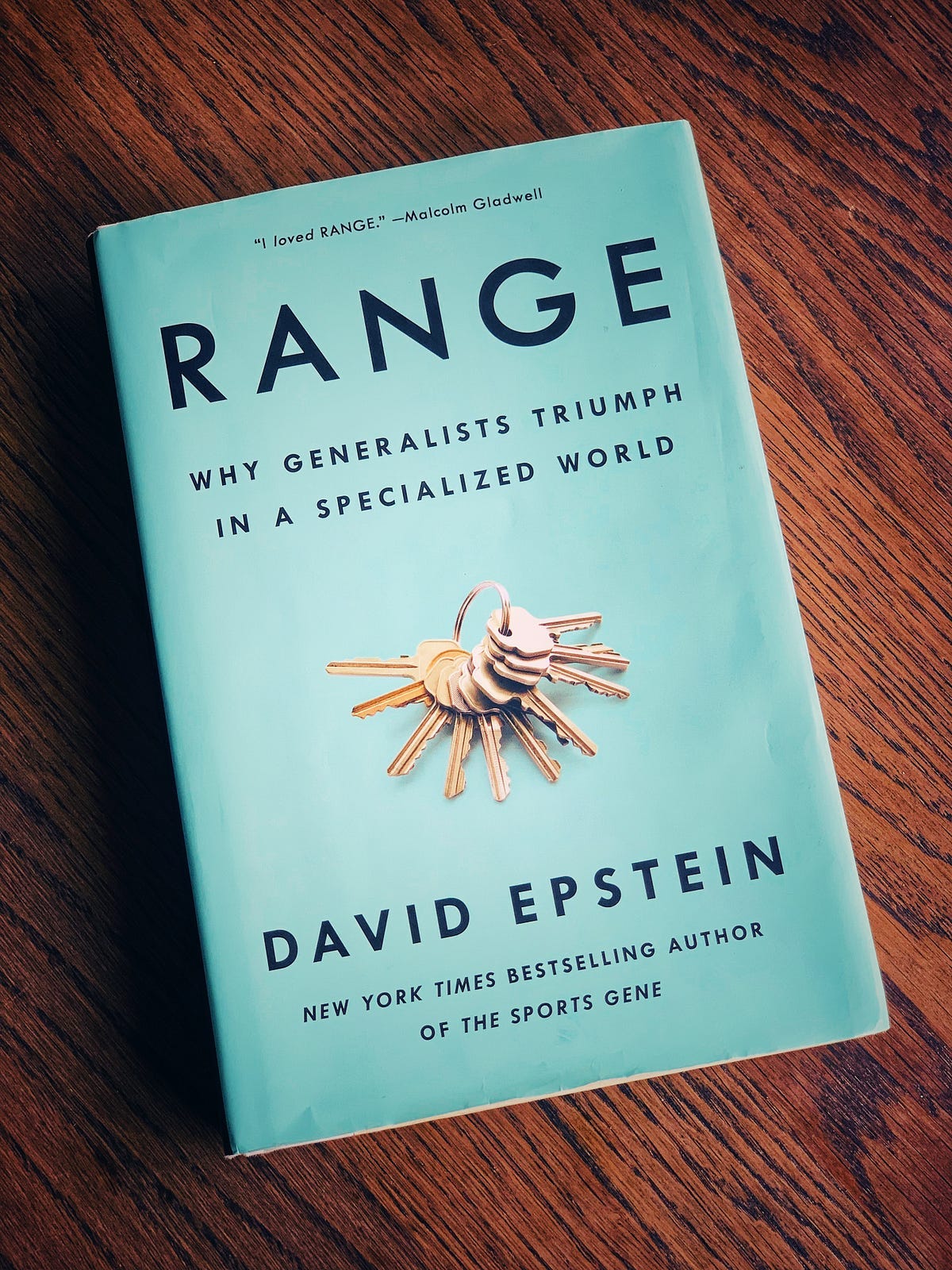Brain Stretch
Keys to Innovation Part 4
Welcome to Polymathic Being, a place to explore counterintuitive insights across multiple domains. These essays take common topics and investigate them from different perspectives and disciplines to come up with unique insights and solutions.
Today's topic is a bit of a book review plus a critical element that I’m finding essential for those interested in the Polymathic mindset. The book is Range: Why Generalists Triumph in a Specialized World and the caveat is to really know who you are so that we can best team together to solve wicked problems.
This is Part 4 of the Keys to Innovation Series. You can find the other Keys here:
Part 1: Embrace the Divergents
Part 2: Face the Fear
Part 3: Rethink the Wisdom of Crowds
Introduction
I recently read the book Range: Why Generalists Triumph in a Specialized World and it felt like a gentle salve on my years of experience. The book’s subtitle captures the gist, and it goes deeply into many examples of how experts, with a narrow focus, are more often less successful, less innovative, and take longer in solving complex problems.
If you are new to this space, that sounds counterintuitive. How can experts be less successful at solving these problems than a ‘jack of all trades?’ Simply put, it’s because as the experts go deeper, the complexity is reduced, and the problem spaces simplify.
Yet the world we live in today isn’t getting simpler. Even just 70 years ago almost everything was just complicated but now we see more and more complexity. Just to clarify, according to INCOSE (International Council on Systems Engineering), complicated systems can be viewed as knowable and deterministic, and once developed their configuration can be “frozen”; whereas complex systems are not fully knowable or deterministic, may be dynamically reconfigurable, and continue to co-evolve with their environment throughout their lifecycle.
Almost all of our specialization focuses on complicated problems that can be solved with processes and systems based on historic knowledge. Complex problems, and the ever-increasing Wicked Problems, require a completely different method of thinking and are typically solved best and most quickly when borrowing across disciplines and domains.
If that sounds familiar, it’s because that’s the entire reason Polymathic Being exists: to explore counterintuitive insights from technology, innovation, philosophy, psychology, and more. We then weave these insights together to help overcome real-world problems by providing a different perspective. At least, that’s my driving principle.
The book is a fantastic exploration of range from Olympic Athletes to CEOs to Scientists (both professional and amateur) across a wide range of problems, cultures, and disciplines. In Chapter 9, they actually introduce the Polymath. They describe them as a “T” shape with breadth and depth vs. the “I” shape of just depth. The interesting observation was the “T”s vertical gets lower the wider they go. This motivates the “T” types to go out to find “I” types to supplement and continue to expand. According to Page 211 in the paperback:
University of Utah professor Abbie Griffin has made it her work to study modern Thomas Edisons - ‘Serial Innovators,’ she and two colleagues termed them. Their findings about who these people are should sound familiar by now: “high tolerance for ambiguity”; “systems thinkers”; additional technical knowledge from peripheral domains”; “repurposing what is already available”; “adept at using analogous domains for finding inputs to the invention process”; ability to connect disparate pieces of information in new ways”; synthesizing information from many different sources”; “they appear to flit among ideas”; “broad range of interests”; “they read more (and more broadly) that other technologies and have a wider range of outside interests”; “need to learn significantly across multiple domains".”
I think they hit everything we’ve covered so far in Polymathic Being! This can mostly be summarized from our Systems Thinking perspective which involves:
Insatiable curiosity, the humility to accept we don’t know as much about the system as we think, and the intentional reframing of problems to see if a change in perspective shifts the definitions. (a’la The Enemy’s Gate is Down)
I will clarify that Thomas Edison from the first quote was less a specialized inventor as he is often characterized and more a perfect Polymath, and that description fits him to a “T.” (pun intended) Everyone loves to attribute 1200 patents to him as if he did it alone but when you coordinate an R&D lab of “I” types and weave it all together, you get listed on a lot of inventions. His skill wasn’t in the details but in running a business that tied together the details into new innovations.
A Caveat on Range
As much as I liked the book, I did not like Chapter 7 at all. The theme is about exploring who you can be. On the surface it’s right, you aren’t artificially limited, and you can stretch, you can change, and you can grow. But this chapter very quickly falls into the ‘you can be anything!’ trope which just isn’t true. Yes, stretch, as we are talking here, but there are certain things you probably just aren’t coded well for.
For example, if you are introverted, feeling, and sensing on the Meyer’s Briggs personality test and toss in some neuroticism and contentiousness from The Big Five that we explored in Investigating Personality Proclivities, you are going to find yourself in a challenging position trying to lead blue sky innovation. It’s not that you can’t, it’s that the deck is stacked against you if you try to do it like an extroverted, intuitive, open type person.
My personal frustration with this chapter is that I’ve seen too many people put themselves into positions that require a stretch but then they try to execute it without realizing their strengths and weaknesses. This causes them to actually fail to stretch and change and ends up making life miserable for everyone.
These are leaders who *know* these roles are important but when they get into the role, they expect everyone to act just like them. That’s not expanding yourself and it certainly restricts others. I don’t see chapter 7 of the book as wrong, but I see it as the one most likely to be misapplied to great catastrophe. My personal bias is I’ve had too many bosses who’d read a book like this, use the right words, and totally miss the point.
This isn’t to tell Experts to stay in their lanes either. Polymathic Being exists to provide skills, crafts, and disciplines to anyone. It’s about the individual looking at who they are, where they are most comfortable and successful, and then recognizing they need to team with others to take it all to the next level. As an axiom I’ve developed over the years captures:
The fastest way to fail is to think you can or should do it by yourself.
Growing Competency
I recently came across a great essay that has an antidote to Chapter 7:
Suw Charman-Anderson weaves a wonderful narrative about competency and closing gaps and articulates the 4 Stages of Competence to growing skills:
Stage 1: Unconscious incompetence: You just don’t know any different
Stage 2: Conscious incompetence: You now know
Stage 3: Conscious competence: You work to be better
Stage 4: Unconscious competence: Skill mastery
I found this a fascinating thread that ties to the essay You Know Nothing about cognitive blindness when we explored the Dunning-Kruger effect whereby people overestimate their skills outside of their experience and Cognitive Dissonance where the brain protects itself from inconsistencies.
In analyzing these 4 stages it is important to recognize that the Dunning Kruger affects anyone whose skills are at level 1, even, and especially the 'experts' who are hyper-focused in one area. They have a ton of unknowns despite their expertise.
It’s also important to realize that most people will never get through stage 2 due to cognitive dissonance where it's so uncomfortable the brain glitches and you become self-righteous and fall back to Dunning Kruger.
These two elements are why I caveat about personalities. If you aren’t the type to really embrace the systems thinking mindset, you’re going to suffer these two cognitive blindnesses. That doesn’t mean you can’t still succeed. Knowing who you are and what you are good at and then being willing to Embrace the Divergents in your teams allows anyone to achieve greater innovation.
Summary
Wrapping it all back, Range is all about the Polymathic mindset but you have to accept how much is outside your competencies, even if you are an expert, and then get through the hurdles of Dunning-Kruger and Cognitive Dissonance to achieve it.
What’s interesting is that a Polymath really doesn’t have to get into Stage 4 on very many topics because mastering the breadth of Stages 2 and 3 is a skill mastery in itself and provides an incredibly wide range of skills to bring to bear, or learn to bring to bear on any topic. It’s a conscious effort of gap analysis and skills closure fueled by insatiable curiosity and humility to accept what you don’t know.
The key isn’t that everyone needs to be a Polymath or that everyone needs to be an Expert. We need both in their domains. It’s not a better or worse, or a lesser or greater. The Polymath without the Expert is just as problematic as the Expert without the Polymath. They work well within their own personality idiosyncrasies and work best when teamed together. The key is knowing who you are and who to complement yourself with.
If this topic interests you, check out this essay on Becoming Polymathic as I’ve woven these ideas into a foundational essay on how to grow your Polymathic Thinking.
Enjoyed this post? Hit the ❤️ button above or below because it helps more people discover Substacks like this one and that’s a great thing. Also please share here or in your network to help us grow.
Polymathic Being is a reader-supported publication. To receive new posts and support my work, consider becoming a free or paid subscriber.
Further Reading from Authors I really appreciate
I highly recommend the following Substacks for their great content and complementary explorations of topics that Polymathic Being shares.
Looking for other great newsletters and blogs? Try The Sample
Every morning, The Sample sends you an article from a blog or newsletter that matches up with your interests. When you get one you like, you can subscribe to the writer with one click. Sign up here.







Great piece Michael. It is somewhat counterintuitive that generalists may outperform specialists, but I imagine, as you allude to, that holds true only in teams comprised of a mix of generalists and specialists. That way, they complement and bring out the best in each other.
This discussion reminds me a bit of how DARPA works. Groundbreaking innovation arises from small, temporary teams of individuals brought together to solve a complex problem. These teams are brought together in forms that may not have occurred otherwise, which is party what makes DARPA so innovative.
The whole can be greater than the sum of its parts.